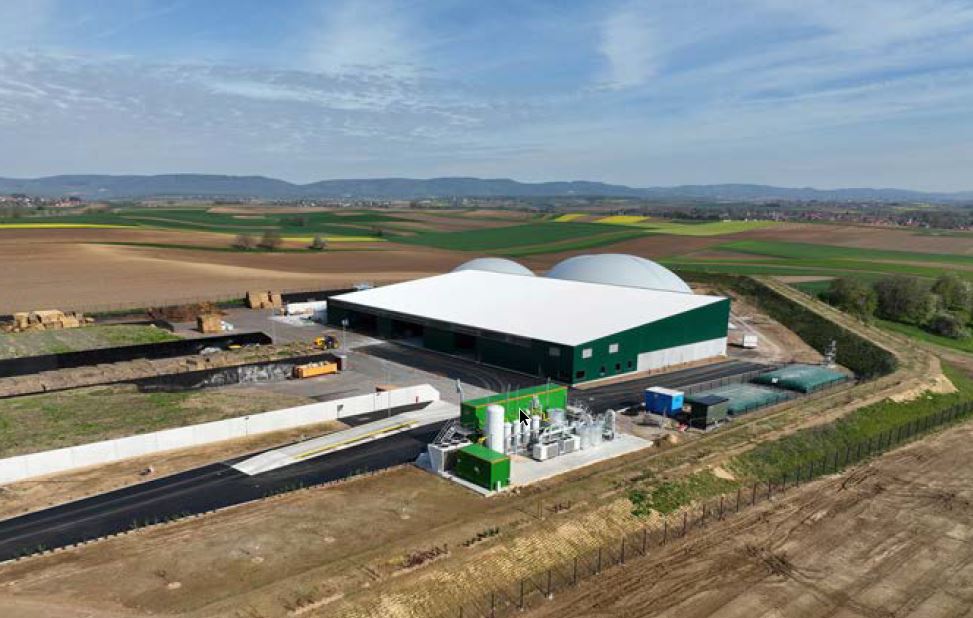France – ETW Energietechnik, in partnership with Rytec planning office, has successfully constructed a cutting-edge biomethane plant in Rittershoffen, Alsace.
This facility, which started operations in February 2023, boasts a processing capacity of approximately 700 normal cubic meters of raw biogas per hour, enabling the injection of up to 350 normal cubic meters of biomethane into the natural gas grid every hour. The plant’s advanced technology, minimal power consumption, and commitment to regional sustainability highlight its potential to make a significant impact on the energy landscape.
The project was initiated by three visionary farmers from Alsace, driven by their commitment to environmental protection and the promotion of regenerative energies in the region. To ensure sustainable agricultural practices, the plant exclusively utilizes agricultural residues sourced locally. This localized approach enhances the plant’s environmental footprint and contributes to the development of a circular economy within the community.
Setting new standard
The biomethane plant’s design is characterized by its exceptionally low power consumption. Consuming only 137.6 kilowatts electrically, the plant sets a new standard for facilities of its size. Even when incorporating a high-pressure compression plant that compresses the biomethane to 67.7 barg, the entire plant’s power consumption remains below 202 kilowatts electrically. This remarkable efficiency, significantly lower than comparable products on the market, ensures that the energy provided by the biomethane exceeds the plant’s consumption, mitigating the risk of future electricity price increases.
The efficient coordination between ETW Energietechnik and Rytec during the project’s inception in 2016, followed by concrete design and planning work in 2019, facilitated rapid and effective construction progress. The simplified interfaces streamlined the development process, enabling the plant to be integrated seamlessly into the landscape. Although concerns were initially raised by residents of the neighboring village, Rittershoffen, the entrepreneurs made substantial investments to address these concerns. Earthworks, the installation of a protective wall, and the planting of native trees and hedges created a visually pleasing and well-integrated facility.
Quality and reliability
The biomethane plant’s technological design places a strong emphasis on quality and reliability. ETW Energietechnik’s SmartCycle biomethane plant incorporates oil-free screw compressors and an intelligent plant control system, resulting in the lowest energy consumption in the market. The use of prefabricated parts from Drössler Umwelttechnik, such as FF pieces and agitator frames, further enhances the plant’s efficiency and robustness. The tank walls, featuring sandwich construction and optimal thermal insulation, come factory-fitted with integrated heating pipes, protected by concrete.
Collaborations with companies like Paulmichl, SATTLER, and BioG have also contributed to the plant’s success. Paulmichl’s stirring and separation technology, featuring powerful external drive technology and panoramic sight glasses, ensures optimal operation and monitoring. SATTLER’s gas storage tanks exhibit remarkable strength and impermeability, backed by their extensive experience in the field. The BioG solids dosing system, including the BioFeeder and BioMerge mixing system, facilitates the introduction and homogenous mixing of more challenging residues, reducing wear and tear on pumps and downstream equipment. The inclusion of double-protected gate valves and measuring technology ensures the plant adheres to the highest safety standards.
Negative CO2 footprint
With its low-energy gas processing plant, ETW Energietechnik, Rytec’s frequency converters, and the future implementation of CO2 liquefaction, the biomethane plant in Rittershoffen is set to achieve a negative CO2 footprint. This commitment to environmental sustainability showcases the plant’s potential to contribute to the reduction of greenhouse gas emissions and combat climate change.
The establishment of the biomethane plant in Alsace marks a significant milestone in the region’s transition to a more sustainable energy future. By utilizing locally sourced substrates, optimizing power consumption, and embracing advanced technologies, the plant not only produces biomethane but also serves as a model for sustainable agricultural practices and regional development.




